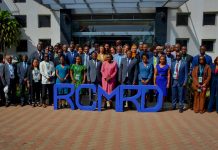By Milliam Murigi
Kenya’s dairy sector is under mounting pressure. The population growth, coupled with rising per capita milk consumption, is driving demand to levels that far exceed current production.
Currently, the country is producing 5.33 billion litres of milk annually, and output must rise sharply to meet the National Dairy Master Plan target of 18 billion litres a year.
To ensure this target is achievable, both the government and the private sector have stepped up efforts to transform the dairy industry. A number of interventions are already underway, ranging from subsidies and feed support to strategic partnerships.
One notable example is the recently signed Memorandum of Understanding (MoU) between the Kenya Dairy Board (KDB) and the International Livestock Research Institute (ILRI), which seeks to drive innovation, inclusivity, and sustainability in the sector.
“This MoU opens the door for a stronger and more resilient dairy sector. It will improve the entire value chain from farm to glass, strengthen food safety through better surveillance and laboratory support, enhance consumer awareness and vendor training, and ensure our policies and standards are guided by solid evidence,” said Appolinaire Djikeng, ILRI’s Director General.
The MOU provides a framework for cooperation to work from ‘farm to glass’ to improve dairy production, processing and consumer awareness. This strategic partnership brings together ILRI’s cutting-edge research and KDB’s regulatory and sectoral leadership to unlock new opportunities for smallholder farmers, processors, and consumers.
” Such collaboration would not only support livelihoods and nutrition but also help Kenya meet its ambitious goal of doubling milk consumption by 2030, ensuring that growth is inclusive, sustainable, and driven by evidence-based solutions,” said Dr. Kimutai Maritim, Kenya Dairy Board Acting Managing Director.
This MOU builds upon previous collaboration between KDB and ILRI around milk food safety. The More Milk project demonstrated how collaboration with vendors and regulators can foster a safer, more sustainable dairy sector.
“Together, this partnership can bridge critical gaps, strengthening the dairy value chain, improving milk safety and quality standards, and scaling innovations that enhance productivity and resilience among smallholder farmers,” added Djikeng.
Apart from the partnerships, the government has also introduced interventions aimed at boosting milk production. One of the key measures has been subsidizing the cost of quality sexed semen and fast-tracking its availability to farmers. This is expected to significantly improve breeding practices and, in turn, enhance milk yields across the country.
Feed and fodder production has also been prioritized. Through public–private partnerships, the government is working with the private sector to expand fodder production while waiving taxes on some of the ingredients used in feed inputs. These efforts are designed to make quality animal feed more accessible and affordable, ensuring that farmers can sustain higher-producing herds.
“The subsidies have already had a visible impact. For instance, the cost of sexed semen has dropped from about Sh 6,000 to Sh 1,000, making it far more affordable for dairy farmers. We even want to reduce it further to about 500 to accelerate the production of heifers, which are critical for sustaining milk production in the long term,” said Kimutai.





